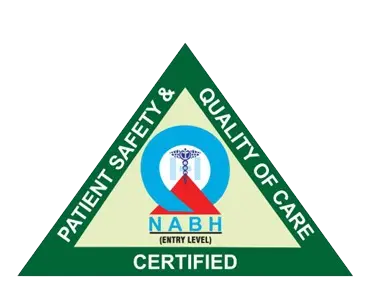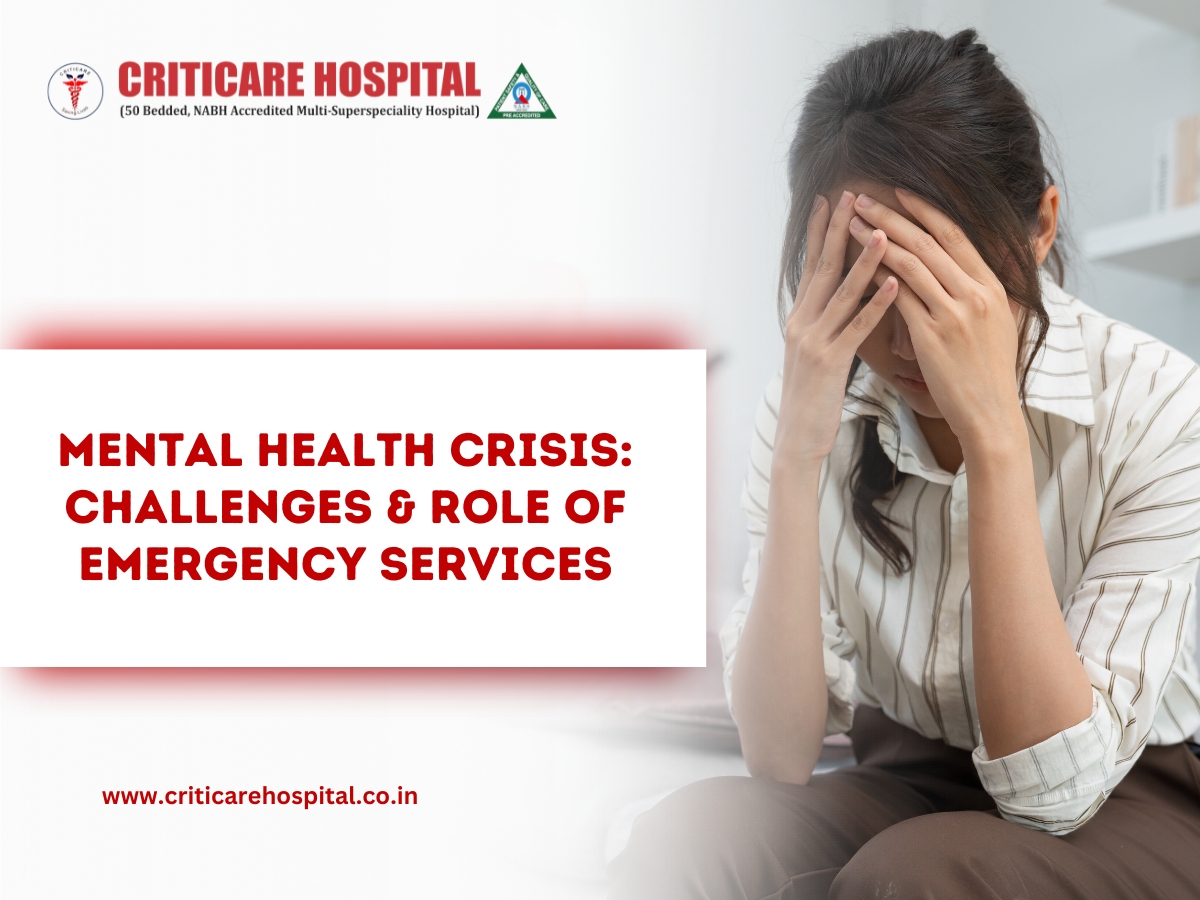Mental health concern is an increasing issue in this fast-paced world. Whether it is worry and depression or even more complicated psychiatric illnesses, individuals across society are suffering in silence. We may think of physical health emergencies, but mental health emergencies exist as well, are very real, very serious, and must be addressed as such. However, the bad news is that, majority of people do not realise the symptoms or where to find solutions.
We think that mental health is as crucial as physical one, at CritiCare Hospital. With this blog, we will guide you to realise what actually mental health crisis is, what issues people have and go through during it and why emergency medical services (such as ours) are of utmost importance in the rescue of lives.
Understanding Mental Health Crisis
Mental health crisis refers to any event that makes an individual or others at risk of being hurt because of their thoughts and feelings, or behaviour. It’s a place where they can no longer handle their life. This may develop over a long period, or it may occur abruptly.
It may appear as follows:
- An individual contemplating or trying to end their life
- A person during a serious panic attack or a psychotic crisis
- When someone is high and drunk on drugs and alcohol are losing it.
- A person with extreme behavioural disorders such as bipolar disorder, schizophrenia or depression
During such times, an individual might not be in a position to make sound decisions. They can harm themselves or other people. This is why fast action saves lives.
Reasons that Mental Health Crises are Left Untouched
Inadequate awareness is the greatest problem with mental health emergencies. A lot of families or friends fail to identify a crisis when it is still early. In other cases, the individuals believe that the individual is simply overreacting or that they are in a phase. The stigma attached to mental illness may make others embarrassed or fear to seek help.
Consequently, people requiring urgent care are often made to suffer in silence or stay untreated, and hence, the issue worsens, with self-harm or death as the ultimate outcomes.
What Causes a Mental Health Crisis?
Crises do not usually occur out of nowhere. They are mostly triggered by:
- There is a loss of a loved one, job, relationship, or even a home.
- Stresses in the forms of work, money or family (long term)
- Substance abuse, generates another instability
- Mental illnesses that are not yet diagnosed, such as depression, bipolar disorders, PTSD, etc.
- Isolation: primarily to the elderly and sometimes to the teens
- Neurological disorders, chronic pain: Medical illnesses
When the pressure of emotions accumulates and support is insufficient, one will have a breaking point. And this is the moment when one needs intervention times.
Signs You Should Never Ignore
When the signs indicating a crisis develop, it can prevent further suffering and trauma. Here are a few key warning signs to look out for:
- Expressing death wishes or threats of self-harm or suicide
- Complete withdrawal from relationships
- Gibberish talk or hearing voices (hallucinations)
- Sudden fits of rage and aggressive behaviour
- Panic attacks and difficulty in breathing
- No sleep, eat, or self-care
- Sudden bouts of confusion or memory loss
- Muchjira changes in mood or paranoia
If any of these signs appear, either in a person or even within yourself, it is of utmost importance to view it and treat it as an emergency.
The Role of Emergency Services in Mental Health Crises
In the case of a physical emergency like a heart attack, someone will rush another person to a hospital. So should it be in case of a mental health emergency? It is an act of urgency. Here is where Neurologist healthcare providers like CritiCare Hospital come.
Let’s understand how we help in such situations:
- Immediately Stabilise
The very first intervention in a mental health emergency may be to try to stabilise the patient, emotionally and physically. This may consist of calming the person down or ensuring that he or she poses no threat either to self or others while administering the appropriate medication under qualified medical supervision. Located in CritiCare Hospital, the emergency officers are trained to deal with such situations with sincerity, patience, and confidentiality.
- Safe and Quick Admission
Our emergency department shall make sure the patient is not kept waiting in long queues or delayed unnecessarily. They will be admitted safely and swiftly so that treatment can commence without any delay.
Such a great relief for many families, feeling that somebody is there to take over when they feel helpless.
- Round The Clock Psychiatric Support
Finding a psychiatrist at odd hours constitutes one of the bigger challenges during a crisis. We have our pool of psychiatric specialists on call round the clock, thus allowing for their expert evaluation and treatment response to be provided to the patient immediately.
- Involving Family the Right Way
Mental health emergencies affect the entire family. We involve close relatives in the care process so they will understand what is going on and what needs to happen next. In addition, our team trains them in providing emotional support at home.
- Ongoing Mental Health Care
The treatment team develops the long-term treatment plan after the patient is out of immediate danger. This might consist of medications, therapies, counselling, or follow-up visits.
Mental health is not a one-day treatment; it is a journey in which we walk together with our patients.
What Makes CritiCare Hospital Prepared For Mental Health Emergencies
At CritiCare Hospital, we have witnessed how devastating the consequences of untreated mental illness can be. Hence, we’ve developed an emergency response system that values compassion as much as clinical excellence.
Why:
- Medical emergency doctors and staff trained in psychiatric crisis response
- Immediate psychiatric support and assessments
- Confidential and non-judgmental approach
- Close linkage between emergency, psychiatry, and therapy services
- Family counselling and support system
- A place for safety in recovery
It may be a teen grappling with suicidal thoughts, or an old man slipping deeper and deeper into depression; the various cases are never too small and time never too late to care for.
What Can One Do in a Mental Health Crisis?
Whether you feel the mental health crisis or someone you care about:
- Keep your head, and never leave the individual unattended.
- Just listen without passing judgment or giving advice.
- Do call the emergency or mental health helpline.
- In case there is a risk, immediately bring this person to the hospital.
- Assisting and letting them know that help is out there and that they can get better.
Conclusion
Mental health is health; you cannot separate the two. The nation has come far in speaking of it; now all that is needed is action. Every hospital must be equipped not only with medicines and machines, but also with compassion and understanding. Emergency services indeed serve the purpose of saving lives by bridging that gap. The more responsive the awareness, the quicker the response, and the more sufficient the system, the fewer people in mental health crisis are going to suffer in silence.
When we deal with mental health emergencies with the urgency and seriousness that is due, we will be able to avoid loss, minimise suffering, provide individuals with an opportunity to recover, and revive their lives.




